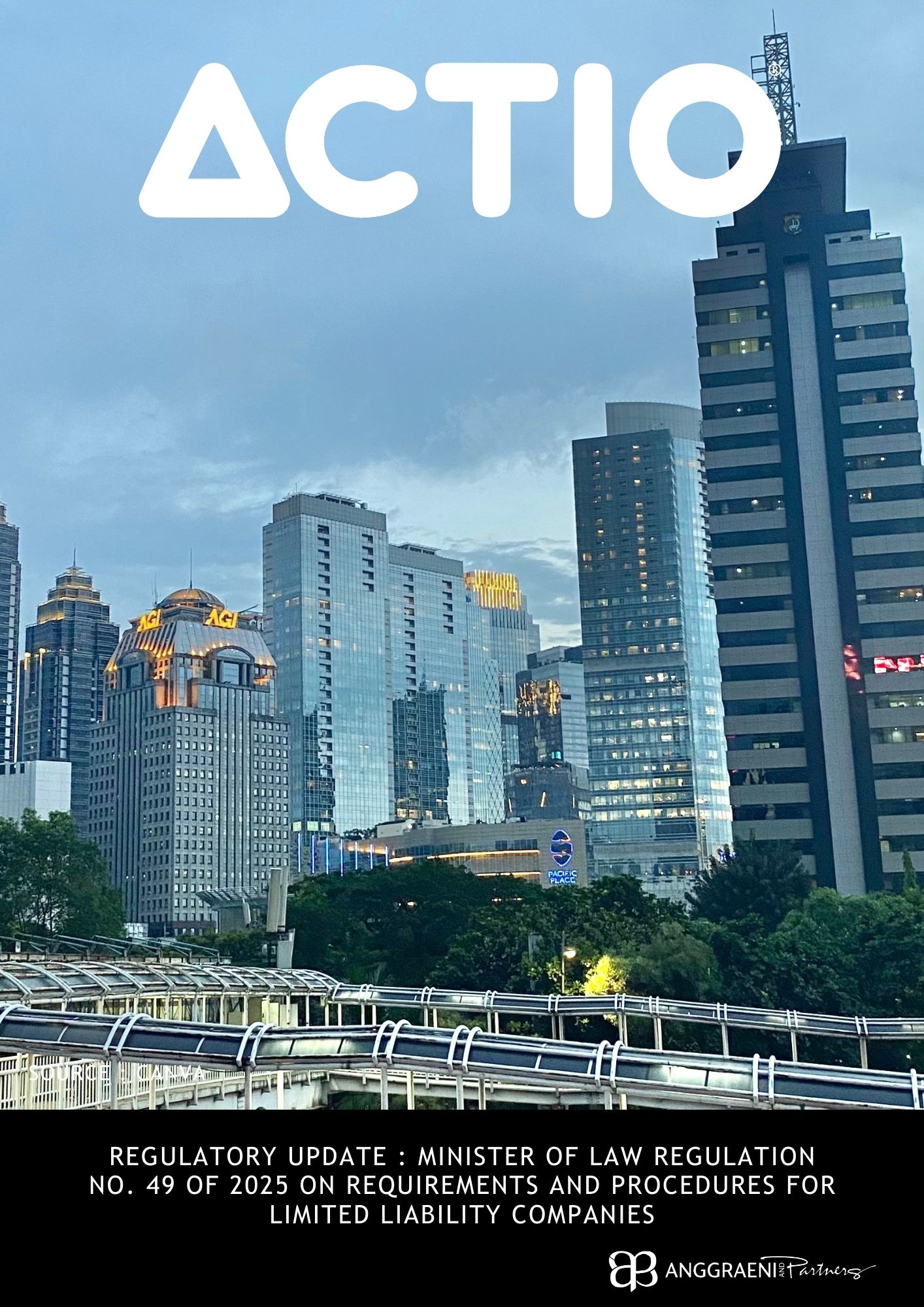- Home
- Capabilities
- ACTIO® Hub
- About Us
- Connect with Us
- AP Library
by Setyawati Fitrianggraeni and Sri Purnama
The introduction of the new Draft Bill on Consumer Protection (Draft Bill)[1] is set to significantly overhaul the legal landscape for consumer protection in Indonesia. This legislative move seeks to address the deficiencies of Law Number 8 of 1999 on Consumer Protection, which, despite its pivotal role during the 1998 financial crisis, has struggled to keep pace with rapid technological advancements and evolving market dynamics.
Enhanced Definitions and Responsibilities
The Draft Bill proposes a comprehensive redefinition of crucial stakeholders, broadening the scope of who is considered a consumer and clarifying the roles of business actors. Under the new framework, a consumer is defined as individuals and entities utilising goods and services for personal or familial reasons without intentions to resell or integrate them into further production.[2] This expansion acknowledges the varied forms of modern consumption, extending protections to a broader range of economic activities.
Business actors are now distinctly categorised into Goods Business Actors and Service Providers, each subject to tailored responsibilities.[3] This categorisation is crucial as it recognises the diverse nature of business operations and the specific challenges each category faces in the consumer market.
Standardised Contracts and Digital Marketplace Safeguards
One of the Draft Bill’s focal points is the regulation of standardised contracts, which have often disadvantaged consumers. The Bill introduces stringent controls over these contracts, ensuring they are drafted in clear, understandable language and free from exploitative clauses.[4] Prohibited clauses now include those unfairly transferring responsibilities to consumers or allowing business actors to alter terms or resolve disputes outside the consumer’s domicile.[5]
These reforms are particularly pertinent in the digital marketplace, where transactions occur with increased frequency and often without direct human oversight. The Bill aims to foster a safer online consumer environment by setting strict guidelines for digital and standardized contracts.
Data Protection and Privacy
In an era when data breaches are increasingly common, the Draft Bill strongly emphasizes consumer data protection. Business actors are mandated to maintain the confidentiality and security of consumer data, implement robust data protection principles, and report any data breaches to regulatory bodies promptly.[6] These measures are designed to build consumer trust and ensure compliance with international data protection standards.
Institutional Reforms and Dispute Resolution
The reform extends to the institutions governing consumer protection. The Draft Bill introduces the Alternative Consumer Dispute Resolution Institution (Lembaga Alternatif Penyelesaian Sengketa Konsumen or LAPSK), replacing the previous body with a more narrowed down authorities and functions, including the ability to handle disputes through mediation and arbitration effectively.[7]
Furthermore, the National Consumer Protection Agency (Badan Perlindungan Konsumen Nasional or BPKN)’s role is significantly expanded, providing it with supervisory powers over the entire consumer protection framework.[8] This includes monitoring business practices, developing consumer protection policies, and facilitating out-of-court disputes.
Compensations and Sanctions
This Draft Bill regulates the filing of a claim for compensation by consumers against business actors, namely the basis for filing a compensation claim[9] and the rights of consumers to file a compensation claim.[10] To apply for compensation by the Consumer, it is not necessary to prove the element of fault,[11] but the Consumer must prove the defect in the Goods and/or Services, the loss experienced, and the existence of a causal relationship between the defect in the Goods and/or Services and the loss experienced.[12]
The responsibilities of Business Actors have been regulated quite clearly in this Draft Bill, namely the forms of responsibility of Business Actors concerning compensation to Consumers,[13] things that can free Business Actors from responsibility to Consumers,[14] and which Business Actors are responsible.[15] Moreover, in this Draft Bill, if a Business Actor commits a violation in carrying out its production and trading activities, the Business Actor may be subject to civil sanctions in the form of compensation for material and/or immaterial losses experienced by Consumers due to violations.[16]
Conclusion
The introduction of the Draft Bill on Consumer Protection represents a proactive step by the Indonesian government to adapt its legal framework to modern commerce and technology realities. By enhancing consumer rights and clarifying the obligations of business actors, the Bill promises to create a more balanced, fair, and safe marketplace for all Indonesians. As these changes are set to significantly redefine the interaction between consumers and businesses, both parties must familiarise themselves with the new regulations and prepare for the forthcoming adjustments.
This legislative update is not just a reform but a necessary evolution in our legal infrastructure to ensure that consumer protection keeps pace with innovation and global standards. As we move forward, continuous monitoring and adaptation will be essential to effectively address any emerging challenges.
Footnotes :
[1] Last access on 10th July 2024 through https://www.hukumonline.com/pusatdata/detail/lt664c938f908d6/rancangan-undang-undang-tahun-2023/.
[2] Draft Bill, Article 1(1)
[3] Draft Bill, Articles 1(5–6)
[4] Draft Bill, Article 27
[5] Draft Bill, Article 26
[6] Draft Bill, Article 49
[7] Draft Bill, Article 67
[8] Draft Bill, Articles 1(19), 59
[9] Draft Bill, Article 33(1)
[10] Draft Bill, Article 36(1)
[11] Draft Bill, Article 33(2)
[12] Draft Bill, Article 33(3)
[13] Draft Bill, Article 37(1)
[14] Draft Bill, Article 39
[15] Draft Bill, Article 35
[16] Draft Bill, Article 38
DISCLAIMER :
This disclaimer applies to the publication of articles by Anggraeni and Partners. By accessing or reading any articles published by Anggraeni and Partners, you acknowledge and agree to the terms of this disclaimer:
No Legal Advice: The articles published by Anggraeni and Partners are for informational purposes only and do not constitute legal advice. The information provided in the articles is not intended to create an attorney-client relationship between Anggraeni and Partners and the reader. The articles should not be relied upon as a substitute for seeking professional legal advice. For specific legal advice tailored to your individual circumstances, please consult a qualified attorney.
Accuracy and Completeness: Anggraeni and Partners strives to ensure the accuracy and completeness of the information presented in the articles. However, we do not warrant or guarantee the accuracy, currency, or completeness of the information. Laws and legal interpretations may vary, and the information in the articles may not be applicable to your jurisdiction or specific situation. Therefore, Anggraeni and Partners disclaims any liability for any errors or omissions in the articles.
No Endorsement: Any references or mentions of third-party organizations, products, services, or websites in the articles are for informational purposes only and do not constitute an endorsement or recommendation by Anggraeni and Partners. We do not assume responsibility for the accuracy, quality, or reliability of any third-party information or services mentioned in the articles.
No Liability: Anggraeni and Partners, its partners, attorneys, employees, or affiliates shall not be liable for any direct, indirect, incidental, consequential, or special damages arising out of or in connection with the use of the articles or reliance on any information contained therein. This includes, but is not limited to, loss of data, loss of profits, or damages resulting from the use or inability to use the articles.
No Attorney-Client Relationship: Reading or accessing the articles does not establish an attorney-client relationship between Anggraeni and Partners and the reader. The information provided in the articles is general in nature and may not be applicable to your specific legal situation. Any communication with Anggraeni and Partners through the articles or any contact form on the website does not create an attorney-client relationship or establish confidentiality.
By accessing or reading the articles, you acknowledge that you have read, understood, and agreed to this disclaimer. If you do not agree with any part of this disclaimer, please refrain from accessing or reading the articles published by Anggraeni and Partners.
For further information, please contact:
P: 6221. 7278 7678, 72795001
H: +62 811 8800 427
S.F. Anggraeni
Managing Partner
fitri@ap-IawsoIution.net
Sri Purnama
Junior Legal Research Analyst
Research Group Transnational Litigation and Tort Law


